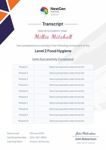- Exam(s) / assessment(s) is included in price
- Tutor is available to students
Medicine Management Strategies for Improved Patient Care
Accredited By CPD | High-quality Materials | Video Lessons | Lifetime Access | 24/7 Tutor Support
NextGen Learning
Summary
Overview
In the UK, medication errors are estimated to cost the National Health Service (NHS) up to £98.5 million per year. Additionally, research has shown that up to 50% of medication-related hospital admissions are preventable. By learning about medicine management strategies, individuals can help to reduce medication errors and improve patient outcomes, ultimately leading to a more efficient and cost-effective healthcare system.
In this course, you will learn about the fundamentals of medicine management, the importance of medicine management, prescribing medication effectively, common problems in pharmacological management, common medicines to use, palliative care, the four principles of medicine optimization, managing medication in residential aged care facilities (RACFs), and law and legislation related to medicine management. By the end of this course, you will be equipped with the necessary knowledge and skills to manage medication effectively and efficiently.
Learning outcomes:
- Understand the fundamentals of medicine management
- Describe the importance of medicine management
- Learn how to prescribe medication effectively
- Identify common problems in pharmacological management
- Understand the common medicines to use
- Learn about palliative care
CPD
Course media
Description
Course Curriculum:
Module 01: Medicine Management Fundamentals - This module introduces the basics of medicine management, including the principles of safe medication management and the role of medication management in patient care.
Module 02: Importance of Medicine Management - This module explores the importance of medicine management in healthcare, including the economic, ethical, and legal implications of ineffective medicine management.
Module 03: Prescribing Medication Effectively - This module covers the principles of effective prescribing, including the correct dose, route, and frequency of medication, as well as the importance of monitoring patients after they have started taking medication.
Module 04: Common Problems – Pharmacological Management - This module focuses on common problems encountered during pharmacological management, such as drug interactions and adverse drug reactions.
Module 05: Common Medicines to Use - This module provides an overview of the common medicines used in the management of different conditions, including their indications, side effects, and contraindications.
Module 06: Palliative Care - This module covers the principles of palliative care and the management of symptoms commonly experienced by patients with life-limiting illnesses.
Module 07: The Four Principles of Medicine Optimisation - This module explains the four principles of medicine optimization, which include choosing the right medication, at the right dose, for the right patient, and at the right time.
Module 08: Managing Medication in Residential Aged Care Facilities (RACFs) - This module provides an overview of the unique challenges associated with managing medication in RACFs, including the use of medication charts and the management of medication-related incidents.
Module 09: Law and Legislation - This module covers the legal and regulatory framework surrounding medicine management, including the responsibilities of healthcare professionals and the implications of non-compliance.
Certification
Upon completion of the course, learners can obtain a certificate as proof of their achievement. You can receive a £4.99 PDF Certificate sent via email, a £9.99 Printed Hardcopy Certificate for delivery in the UK, or a £19.99 Printed Hardcopy Certificate for international delivery. Each option depends on individual preferences and locations.
Who is this course for?
- Healthcare workers
- Medical students
- Individuals interested in a career in healthcare
- Caregivers for elderly or ill family members
Career path
- Healthcare assistant: £16,000 - £20,000 per year
- Assistant Nurse: £24,000 - £38,000 per year
- Pharmacist: £38,000 - £58,000 per year
Questions and answers
Currently there are no Q&As for this course. Be the first to ask a question.
Reviews
Currently there are no reviews for this course. Be the first to leave a review.
Legal information
This course is advertised on reed.co.uk by the Course Provider, whose terms and conditions apply. Purchases are made directly from the Course Provider, and as such, content and materials are supplied by the Course Provider directly. Reed is acting as agent and not reseller in relation to this course. Reed's only responsibility is to facilitate your payment for the course. It is your responsibility to review and agree to the Course Provider's terms and conditions and satisfy yourself as to the suitability of the course you intend to purchase. Reed will not have any responsibility for the content of the course and/or associated materials.




